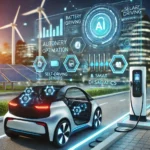Introduction The integration of Artificial Intelligence (AI) in the EV industry is transforming the way electric vehicles (EVs) are designed, manufactured, and operated. AI is revolutionizing smart EV technology by enhancing energy efficiency, optimizing battery performance, and enabling autonomous electric vehicles. With advancements in machine learning in the EV industry, AI-driven solutions are making EVs smarter, safer, and more sustainable. In this article, we explore how AI is shaping the future of electric mobility and its impact on different aspects of the EV ecosystem. How AI is Transforming the EV Industry The rapid adoption of AI-powered electric cars is driven by advancements in data analytics, cloud computing, and the Internet of Things (IoT). AI is applied in various areas, including predictive maintenance in electric vehicles using AI, self-driving capabilities, battery management, and AI-driven EV charging systems. Here’s how AI is reshaping the EV industry: 1. AI for EV Battery Optimization One of the critical challenges in the EV industry is battery performance and longevity. AI-based battery management in EVs helps optimize charging cycles, prevent overheating, and extend battery life. Neural networks in electric cars analyze battery data in real-time, enabling predictive analytics to improve energy efficiency and reduce degradation. 2. AI-Driven EV Charging Systems AI is playing a crucial role in building a smart AI-based EV charging solution. By integrating AI with EV charging infrastructure, smart charging stations can dynamically adjust power distribution based on energy demand and grid availability. Additionally, AI-driven Vehicle-to-Grid (V2G) technology allows EVs to supply electricity back to the grid, creating a sustainable and efficient energy ecosystem. 3. AI in Self-Driving Electric Cars Autonomous electric vehicles rely on AI-powered systems for navigation, object recognition, and decision-making. AI in self-driving electric cars uses deep learning algorithms and LiDAR technology to process sensor data, enabling real-time autonomous driving. Companies like Tesla, Waymo, and Rivian are investing heavily in AI-driven autonomy to enhance vehicle safety and performance. 4. Predictive Maintenance in Electric Vehicles Using AI AI-powered predictive maintenance in electric vehicles helps identify potential failures before they occur. By analyzing historical and real-time vehicle data, AI algorithms predict when components like brakes, batteries, and tires may need servicing. This reduces downtime, lowers maintenance costs, and enhances vehicle reliability. 5. AI for Range Prediction in Electric Cars AI for range prediction in electric cars is improving driving efficiency by accurately estimating battery range based on driving behavior, road conditions, and weather. Machine learning models analyze these factors in real time, helping drivers make informed decisions to optimize their journey and reduce range anxiety. 6. AI in Fleet Management for EVs Fleet operators are leveraging AI in fleet management for EVs to optimize route planning, energy consumption, and vehicle usage. AI-powered analytics provide insights into fleet performance, enabling businesses to reduce operational costs and improve sustainability. 7. AI in Connected Cars and Smart Mobility The rise of AI in connected cars and smart mobility is enabling seamless communication between vehicles, infrastructure, and cloud-based platforms. AI enhances intelligent transportation systems, allowing for real-time traffic analysis, accident prevention, and automated decision-making. 8. AI-Driven Energy Efficiency in EVs AI enhances AI-driven energy efficiency in EVs by optimizing powertrain performance, reducing energy wastage, and integrating renewable energy sources. AI-based systems monitor energy consumption patterns to suggest efficiency improvements, contributing to the sustainability of electric mobility. 9. AI Applications in Next-Generation EVs The future of AI in electric mobility includes innovations such as AI-powered voice assistants, adaptive cruise control, and real-time driver monitoring. AI is also being integrated into smart grid for electric mobility, enabling efficient energy distribution and reducing the environmental impact of EVs. FAQs 1. How is AI transforming the EV industry? AI is revolutionizing the EV industry by optimizing battery performance, enabling autonomous driving, enhancing predictive maintenance, and improving energy efficiency. It is also used in smart charging infrastructure and fleet management. 2. What role does AI play in self-driving electric cars? AI enables self-driving electric cars by processing real-time sensor data, recognizing objects, making driving decisions, and navigating complex environments. It ensures safety and efficiency in autonomous driving systems. 3. How does AI improve battery management in EVs? AI-based battery management systems optimize charging cycles, predict battery failures, and prevent overheating. Machine learning in the EV industry helps improve battery longevity and energy efficiency. 4. Can AI help with EV range prediction? Yes, AI for range prediction in electric cars analyzes driving patterns, weather conditions, and terrain to provide accurate battery range estimations, helping drivers plan their trips effectively. 5. What is the future of AI in electric mobility? The future of AI in electric mobility includes advancements in autonomous driving, smart grids, AI-driven energy management, and real-time traffic analytics. AI will continue to enhance safety, efficiency, and sustainability in the EV industry. Conclusion The integration of Artificial Intelligence in EVs is transforming the electric vehicle industry, making it smarter, more efficient, and more sustainable. AI-driven innovations in EV energy management, predictive maintenance, autonomous driving, and smart charging infrastructure are shaping the future of electric mobility. As AI continues to evolve, it will play a crucial role in accelerating the adoption of AI-powered electric cars and creating a cleaner, greener transportation ecosystem.

